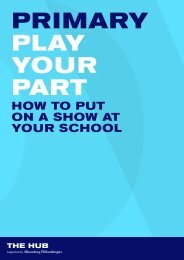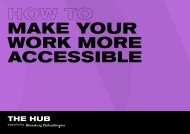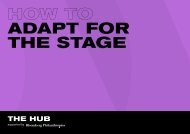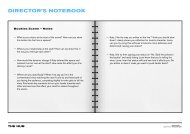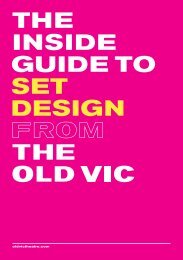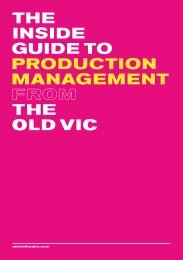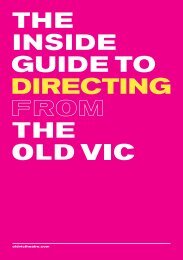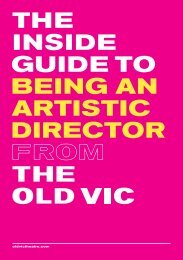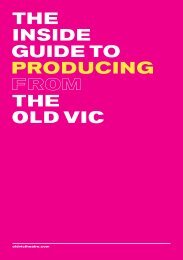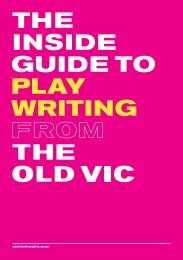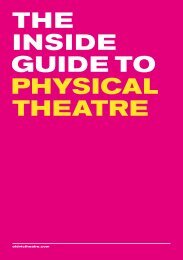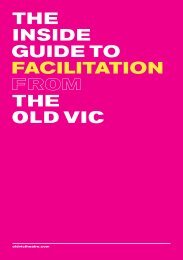Help with your employability
You also want an ePaper? Increase the reach of your titles
YUMPU automatically turns print PDFs into web optimized ePapers that Google loves.
HELP
WITH YOUR
EMPLOYABILITY
DID YOU
KNOW?
The Department of Education recently found that 50%
of graduate jobs do not require a specific degree
specialism from candidates. Instead, employers
look for graduates with strong ‘soft’ skills.
Our flagship employability programme Take the
Lead focuses on the importance of five core skills:
communication, teamwork, problem-solving,
self-reflection, and self-belief. These skills are
fundamental to our work as a theatre company
both offstage and on. However, they are also
transferrable skills that can be easily and usefully
applied by those working in any industry.
We asked some members of The Old Vic Team,
and our Principal Partner, Royal Bank of Canada
(RBC), to reflect on the skills they’ve developed on
their own career paths, and to offer any insights
that may help you in your employability.
THREE HOT TAKES TO HELP WITH
YOUR EMPLOYABILITY
Faisal Manji, Associate Director, Global Manager Research, RBC Wealth Management
Embrace what makes
you different
It’s important not to feel too much pressure
to conform to the skillset or background of
someone who’s currently in a role that you’re
thinking of applying for. Your unique set of
experiences, interests and way of thinking
is going to bring something different to the
table. That’s something that people who are
hiring really look for.
Keep adding skills
It sounds obvious, but jobs are becoming
increasingly multi-skilled, and you’ll stand
out if you possess a range of skills that
differentiate you from others. The easiest way
to do this is to find areas that you’re already
interested in and think about which new
skills you can apply to those areas. It might
be building out a simple website or growing
a social media page, creating a database or
using some coding to create a simple app
or solution to something. Integrating those
examples into your job search will help make
you stand out.
Think differently
about intelligence
Intelligence is not all about exam results.
Social intelligence, emotional intelligence
and cognitive thinking are all really important.
Having an awareness of how people behave
and operate, understanding people’s needs
and behaviours; in an increasingly digital
world, we are losing some of these skills.
It’s important to retain and practise them by
working, collaborating and connecting with
people, and taking time to understand what
makes them tick. These skills will help you in
a working environment.
A BEGINNER’S GUIDE TO NETWORKING
Jessica Lynch-Blosse, Human Resources Associate Director, The Old Vic
Expect some
awkwardness on
your first network
A lot of others in the room will be feeling the
same, even if they don’t appear to be. Don’t
be tempted to take out your phone; be open,
find eye contact, walk towards someone
and the words will find you. Active listening
goes a long way – you’ll be surprised how a
conversation grows.
Remember names
This can be especially hard when you meet
a lot of people at once. Re-introducing
someone to someone else might help you
remember their name and it shows you’ve
invested in the conversation.
Nurture relationships
Think about your relationship in phases and
reach out to the person you connected with
after a couple of weeks – the next time you
meet will be easier as you have already done
the groundwork. Do they have any issues
that you might be able to help fix? Or could
you connect them to another contact who
might be able to offer support? You never
know when they may be able to return
the favour.
WRITING AN ELEVATOR
PITCH: TOP TIP
Caroline Simonsen, Participation
Manager, The Old Vic
For me, a really easy way of writing your first elevator pitch is by using
the ‘Past, Present, Future’ structure. Talk about what you have done
in the past, where you are right now, and what you want to do in the
future. Next, add in details such as the reason you have chosen your
future career goal or what skills you have developed from your past
experiences. As well as being a great tool to use in interviews and
cover letters, I find writing an elevator pitch to be a useful personal
exercise as it challenges me to clearly define my goals, values
and ambitions.
COVER LETTERS
DOS & DON’TS
Danny Krohm, Front of House
Manager, The Old Vic
I want to see an applicant’s passion when I read their cover letter;
I want to see their excitement and what drives them. I get so many
cover letters detailing someone’s acting experience. Great – but what
does that have to do with customer service? You need to make sure
you are leading with relevant experience and if you don’t have that
experience, think about hobbies or things you might have done at
school that have left you with transferable skills. I love it when people
share their love for the theatre and when their passion for the job
comes across – that’s the main thing I want to see.
INTERVIEW INSIGHTS
Jay Yadav, Client & Business Development, RBC Wealth Management
Research
You often only have a couple of minutes to
make a great impression, so it is vital to do
some preparation before your interview. You
are often provided with your interviewer’s
name. Take some time to find out more about
them and identify common interests that
you can draw on to build rapport in a short
time. It could be anything from basing one
of your responses on a common interest,
highlighting organisations you admire that
you know they are affiliated to, or even
mentioning a common previous employer.
In addition to learning about your interviewer,
learn as much as possible about the
company you are applying to. Understand,
digest, and remember the business’ values
and link these back to the role you are
applying for. Being able to provide concrete
examples of things you admire about the
company shows an active interest in it and
proves your commitment to the position.
Individuality
Be your true self 100% of the time. We
often try and fit the mould of a preconceived
idea of what a ‘successful person’ looks
and sounds like. However, we forget the
most successful among us are the ones
who think outside the box and provide
different perspectives. In my experience,
taking examples of my work to interviews
as ‘discussion documents’ is very helpful
as I can control and lead the conversation,
ultimately demonstrating the best version
of myself.
Prospects
Avoid applying to as many roles as you
possibly can just to land a job. This will result
in you wasting your own and someone else’s
time by interviewing for a role you never
really wanted. Start with the end in mind
and try to work out where you want to be in
the next five years – easier said than done!
To start, it may help you to create a list of
companies that interest you and rule out
others that don’t.
ONCE YOU’VE GOT THE JOB
Emma Hicks, Communications Advisor, RBC Wealth Management
Ask questions but make
your own decisions
It’s important to have someone around you to
ask about the world of work – someone who
can answer any questions you might have
about things such as salary expectations
for a first job and how to stand out during
an interview. Whether that person is a
sibling, parent, tutor or friend, ask for their
advice to get as many perspectives as you
can – arm yourself with as much information
as possible.
Prioritise learning
Once they’ve finished formal education,
most people are absolutely thrilled at the
thought of never having to sit hunched over
a textbook again, highlighting texts and
memorising facts and figures. However,
those tasks will inevitably prepare you for
your first role. Don’t be afraid to constantly
ask questions and ask for opportunities that
push you out of your comfort zone – that
is how you continue to grow in your career
and it will also demonstrate to others that
you care about your work and want to excel,
which is always a good thing.
You are allowed to
change your mind
When I told my parents that I wanted to read
Creative Writing at university, they were
supportive but apprehensive. There was a
lot of discussion about what I would do with
a degree where the most obvious trajectory
was to become an author. Upon starting
school, I found my footing at the student
newspaper and thought I would become a
journalist but realised after graduating that it
wasn’t the path I wanted to be on.
I found a happy medium with corporate
communications, which allows me to engage
with my creative side and has opened my
eyes to how vital good communications
are within any company regardless of the
services it provides. I never thought when I
went off to school that I would be where I am
today, and I wouldn’t be be here if I hadn’t
been willing to pivot and try something new.
There are very few people in the world who
are actually doing the job they aspired to
have when they were first asked at the age
of six, and there should be no expiry date
as to when you can change your mind on
how you want to spend your time and live
your life.
Guide compiled by Simon Pollard



